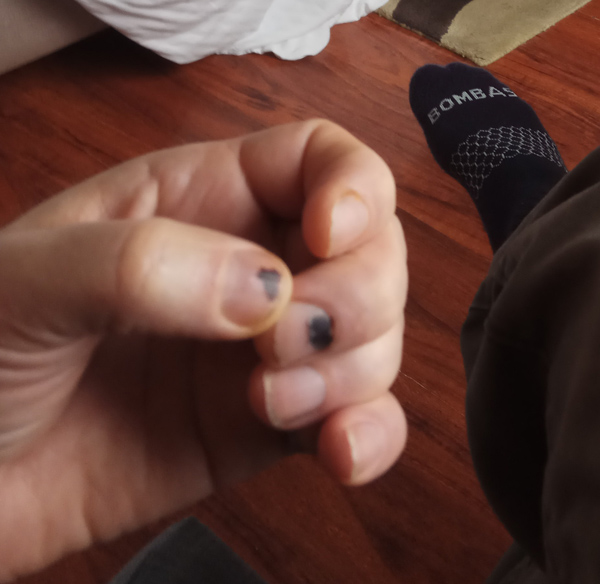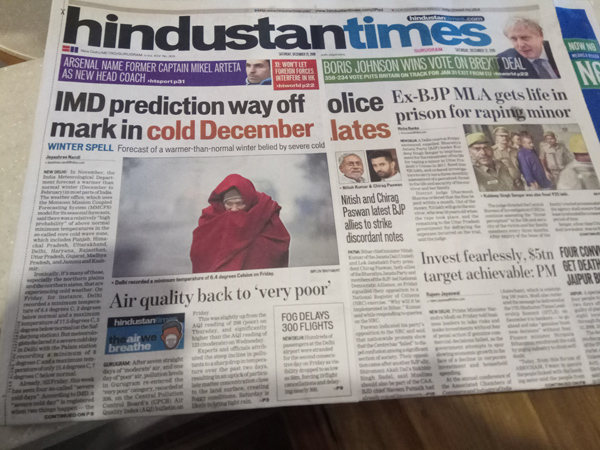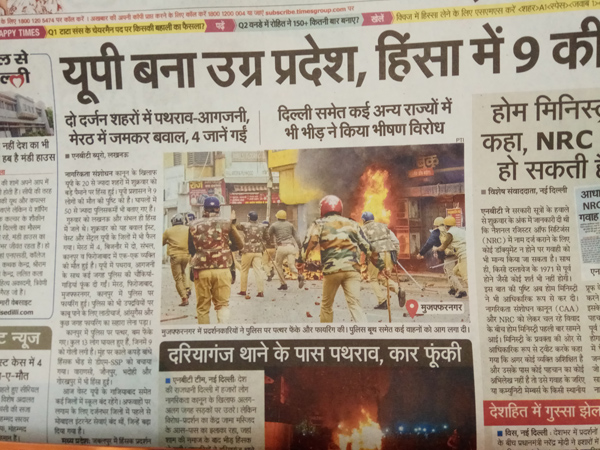|
|
|
winter in Gurugram
Friday, December 20 2019
Because of how my entertainment system had been behaving, I hadn't realized that it was possible to view a live map of our progress around the globe. But then I saw someone else viewing it on his entertainment system. At the time we were over the west coast of the center of Denmark, nearly 1000 miles south of where we should've been had we been taking the shortest (that is, great circle) route. This meant we would be flying over considerably less of Russia, but we would nevertheless fly over some of Russia, as well as Afghanistan, the latter of which we would've mostly avoided had we been on a great circle route. For me, the rest of the flight was about as unpleasant as airline flight can be. The diphenhydramine made it possible to sleep, but never for more than a few minutes at time, as the flight had been so long that its effects had begun to weaken. A dose of ambien would've probably worked well, but I don't have experience mixing sleep medications and didn't want to be too experimental trapped in a hurtling aluminum tube.
After fourteen hours, our plane descended through dense fog (or was it smog?) and landed at the Delhi airport. For the first time, we watched the landing and taxiing process on a video feed supplied by our entertainment system, which was more interesting than I would've expected, particularly after the featureless grey of the fog started to thin and we could see the approaching runway.
It takes a long time to disgorge 500 people from an airplane, and we were back near row 45. Once we got off the plane, the immigration line for foreigners was mercifully short, though the processing for each person took longer than seemed necessary. Everyone had to be fingerprinted and photographed, a pointless humiliation some countries have started doing after the United States pioneered the practice. Since we were being picked up from the airport by someone from an outfit known as Veg Voyages, we didn't know where in India we'd be staying. But the form we'd been given had requested an address. Not knowing what else to put, we'd written "Rajasthan." But the hardass as immigration told us that there was no way we could get through without an address. Gretchen pleaded that there was a guy waiting to pick us up and he knew where we were going, but we didn't. The hardass didn't care. So Gretchen tried turning on the data plan on her phone to see if she could obtain some very expensive information from her Gmail account. When it refused to provide an internet connection (and the airport's free WiFi proved inaccessible), we turned to other people in line, asking them for the address of a hotel they were staying at. The hardass could tell that we were simply going to write down some random hotel and he smiled with a mix sadism and bureaucratic bemusement. When we had this information, we went through immigration with the other official serving our line. He was much nicer, and before long our passports were properly stamped and we could proceed to customs. Customs, by contrast, was nothing at all. We walked through without having to interact with anyone.
And there, among the throng of people waiting for arriving passengers, was a man holding a sign featuring our first and last names in large characters. This was J, one of several Indians who would be handling the logistics of our two weeks in his country. He took us to a car that came with a driver. From then on, we didn't really have to think or do anything. The driver drove us down the crazy streets and highways from the Delhi airport to the satellite city of Gurugram. The traffic reminded us what we'd seen in other major urban areas in third world nations, particularly Costa Rica and Uganda. Like Uganda, people drive on the left side of the road in India, which, as a passenger, always takes awhile to acclimate to. The lines on the road acted as mere suggestions, and people make frequent use of their horns. Everything non-living we saw seemed run-down, grimy, and lived-in. This applied to the buildings, dusty landscape, and especially the vehicles. It was rare to see a vehicle that hadn't had a scrape against something, and such cosmetic damage is apparently so common that nobody bothers to repair it. It's a mindset that is familar to our household; our cars are nothing more than tools for us, and there's no sense in worrying all that much about scratches, dings, cracks, and body panels that can't quite be fitted back together the way they used to be.
As expected, India teams with humanity. They trudge along the roads in festive colors, carrying things on their heads. Or they sit in the dirt on the side of the road waiting or operating a tiny business. In among them mingle dogs, cows, and occasionally goats and pigs. It's a whole ecosystem of street-smart beings, and if anything ever gets killed by all those crazily-moving vehicles, I saw no evidence of it.
I asked J about the air. Was it fog or pollution? He insisted it was the former, perhaps to keep us from being ill at ease so early in our vacation. But why then did the air smell faintly of electrical fire?
Our hotel was the Ferns, located in a fairly souless office-park area of Gurugram. It's among the least expensive of a group of hotels catering to foreigners, and soon we were to discover why. It being winter in India, temperatures in the daytime never rose out of the 60s and would reliably drop into the 40s at night. But our room (#301) only had a working air conditioner. And the credentials given for the WiFi didn't work. Gretchen called down to the office to complain about the WiFi, so the "IT person" was sent up (he would later be the same guy as the "heating person"). He futzed around before concluding, as I had, that the router needed rebooting (or similar). (It was hard to tell what he was thinking, since his English was mostly unintelligible.) Then it turned out that the credentials we'd been given with such confidence were completely wrong. After much back and forth, the WiFi eventually was made to work, though the heat never did. We ended up huddling under our blankets, poking at our devices while music videos and Bollywood played on our big room television. I had no way to charge my laptop, since I lacked European-style adapters, but we could charge our phones by plugging USB cables into the television and the cable box.
[REDACTED]

The state of my fingernail hematomas at the beginning of the India trip.

Headlines this morning in the English-language Hindustani Times.
Click to enlarge.

Headlines this morning in a Hindi newspaper. There are currently protests throughout the country against a decidedly-Trumpian anti-Muslim citizenship amendment passed earlier this month.
Click to enlarge.
For linking purposes this article's URL is:
http://asecular.com/blog.php?191220 feedback
previous | next |


